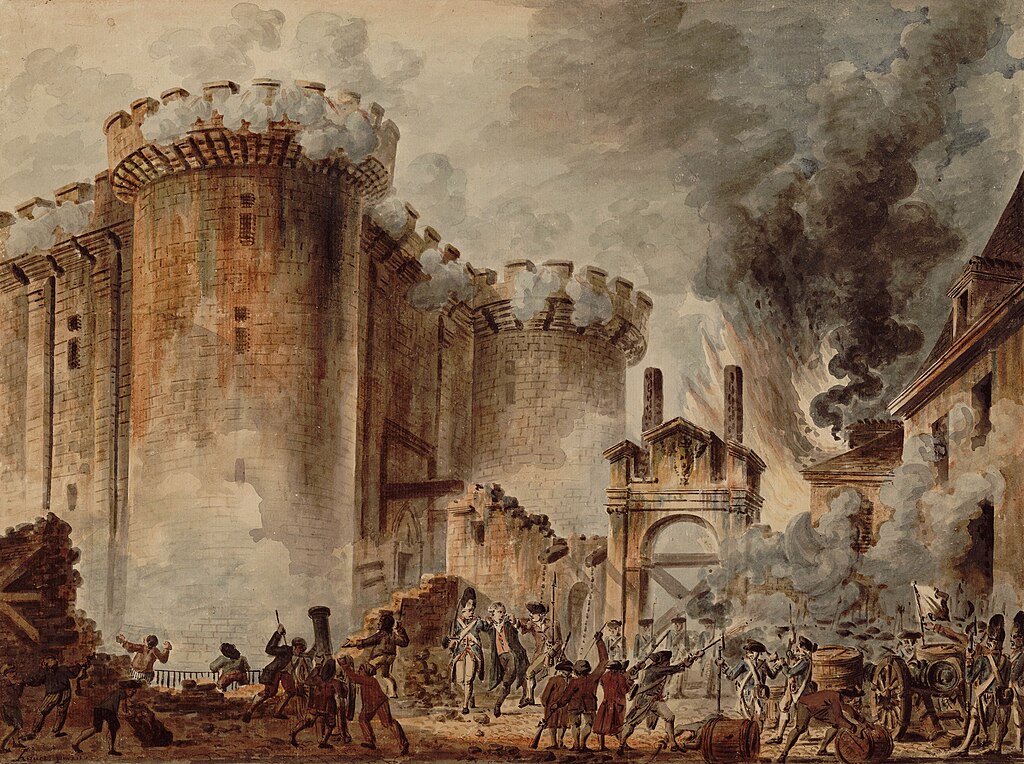Bastille Day, celebrated on July 14th is France’s national holiday and a day of exceptional pride and patriotism for toutes les Françaises. Known in France as both “Le Quatorze Julliet,” and “La Fête Nationale,” this significant day commemorates a pivotal event in French history that is considered the physical starting point of the French Revolution: the storming of the prison at Bastille. But what circumstances led up to this crucial moment in history and how does its legacy continue to impact French politics including the most recent elections? Keep reading to find out!
The Origins of Bastille Day
 Courtesy of Wikimedia Commons
Courtesy of Wikimedia Commons
On July 14th, 1789, the sans-culottes, aka the lower and middle classes of Paris stormed the Bastille, a medieval fortress that had been transformed into a prison that concretized and symbolized the oppression under the absolutist monarchy of King Louis XVI. The Bastille was notorious for embodying socio-political repression as it contained political prisoners, dissidents against the monarchy, radical writers, and others detained by the king’s arbitrary orders, known as “lettres de cachet.” The storming of the Bastille was not only an assault on the physical structure of the prison itself but more urgently a long awaited attack on the pervasive economic, political, and social injustices inflicted upon the French people under the autocratic rule of the monarchy. Although the prison held seven inmates at the time, the event proved to be a major turning point that ignited widespread rebellion against tyranny across France. The storming occurred amidst unprecedented economic hardship in the history of France, nearly universal famine, and accumulating discontent with the monarchy’s oppressive taxation and extravagant spending. The Estates-General, convened in May 1789, had failed to address the grievances of the Third Estate, which represented the common people. This frustration culminated in the formation of the National Assembly and the Tennis Court Oath, where delegates vowed to establish a new constitution.
Historical Significance
The fall of the Bastille ushered in the end of absolute monarchical authority and the beginning of democratic power enacted by the French people which was thereafter consecrated in documents such as the Declaration of the Rights of Man and of the Citizen, and the event establishment of the First French Republic. The revolution propagated profound political and social changes, including the abolition of feudal privileges, the establishment of secularism, and the spread of democratic ideals. These principles not only reshaped France but also the subsequent history of Europe and democracy across the continent.
Contemporary Celebrations
Paris, the capital of France, is the epicenter of all Bastille Day celebrations! The day commences with an enormous military parade on the Champs-Élysées, the oldest and largest regular military parade in Europe. Presided over by the President of the Republic, it features troops, military bands, and a display of aircraft. At night, spectacular fireworks light up the sky over landmarks such as the Eiffel Tower and the Seine River in addition to more localized displays in the suburbs and along the Seine’s tributaries. Public squares and streets are filled with locals and tourists alike enjoying concerts, parties, and communal meals. In Paris, the Firemen’s Ball, hosted by fire stations across the city, is a beloved tradition where revelers can dance the night away. Across France, towns and cities celebrate with parades, fireworks, and other community events. From small village gatherings to large urban festivities, Bastille Day is a time for French citizens to unite in celebration of their national identity and democratic heritage. French expatriates and Francophiles around the world also also join in the celebrations. French embassies, cultural centers, and communities host events, bringing a touch of French patriotism to cities across the globe.
Bastille Day is more than a national holiday; it is a celebration of the French tenets of liberty, equality, and fraternity. It honors the courage of the citizens who fought for their right to democracy, expansion of legal rights, and freedom from tyranny. Whether through the grandeur of the Parisian parade, the joy of fireworks, or the unity of community, Bastille Day is a perennial reminder of the power of the people and of the progressive values that have shaped modern France.